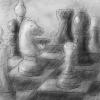How can a game have any personality what so ever if everyone involved gets a real say as to what direction the game goes in.
Are you suggesting that the industry has never produced a game with "personality"?
There may be a lot of blandness out there, and a lot of games that aren't to your liking, but in the overwhelming majority of cases most if not all participants in a games creation have some impact on the direction of the final product, and I'd say there are definitely some games that have real character that have resulted from this process.
Compare it to music -- which is typically considered an art -- and where it's common-place for multiple people to collaborate on the writing and production of a song to produce the final product. There's no reason you must have a single artist to produce a piece with "character" or to stick to a vision, and music provides thousands of examples of that -- even in Classical music where the composer has dictated the entire piece note-for-note and often includes additional instructions, performances can vary greatly based on nuances introduced both by the conductor and by individual musicians. Songs are also often covered by bands with completely different styles who produce an entirely different take on the original piece, or remixed to produce an entirely new piece of music. All of this is widely accepted as art, and all of it is the product not of a single individual's vision, but of a collaboration between many people who all contribute.
If music is art produced by collaborations then why can't games be the same? Perhaps the solution is not for individual designers to establish dictatorial control as you're suggesting, but for teams to learn to work better together with a shared vision.












